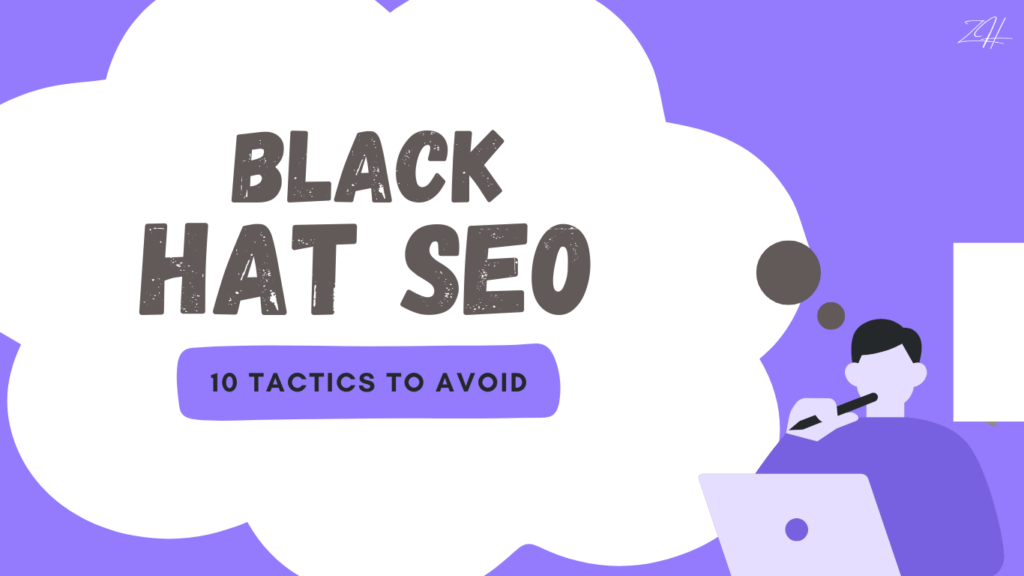
10 Black Hat SEO Tactics You Should Avoid
Getting top search engine results is a target every website owner in the cutthroat realm of digital marketing aims for. But especially when rapid results are sought, the temptation to turn to unethical methods—known as Black Hat SEO—can be great. Black Hat SEO is the set of techniques used to unfairly influence search results by breaking search engine policies. Although these strategies could provide temporary benefits, they could also result in harsh fines and ban from search engines. Ten Black Hat SEO strategies you should avoid can help to guarantee that search engines will continue to view your website in good standing.
1. Keyword Stuffing:
Keyword stuffing is the too frequent use of alt texts, meta tags, and keywords in your work. The intention is to control search engines to rank the page higher for such keywords. Although that might have worked in the early days of SEO, search engines have grown far more complex. Keyword stuffing today not only seems odd to readers but can also result in Google’s penalizing action. Rather, concentrate on producing
excellent material with natural integration of pertinent keywords
2. Cloaking:
Cloaking is the dishonest habit of presenting different from what consumers perceive content to search engines. This strategy seeks to fool search engines into giving the site irrelevant keyword or topic ranking. A website might provide search engine results on “healthy recipes” for instance yet show consumers a page about weight reduction pills. Cloaking goes against search engine policies and carries heavy fines, including total removal from search engine indexes.
3. Linkages and Hidden Text:
Hidden text and links are material or links arranged on a page such that they are invisible to humans but clear to search engines. This can call for hiding links inside images, zero font size, or white text on a white background. The idea is to change search results by putting links or keywords on pages without compromising user experience. Search engines are now rather good at spotting such behaviours; websites detected employing links or hidden material run significant fines.
4. Multiple Content:
Another Black Hat SEO strategy to avoid is producing duplicate material on several pages or websites. Duplicate material can complicate search engines’ ability to identify which version is most pertinent. Lower rankings or perhaps exclusion from search results can follow from this. Rather than copying material, concentrate on producing original, top-notch work for your readers that adds value.
5. Private Blog Networks (PBNs):
Private Blog Networks (PBNs) are a system of websites designed to create links to one site in order to control search engine results. Usually composed of expired domains with established authority, these networks PBNs might provide temporary ranking increases, but search engines like Google are always refining their algorithms to find and punish these networks. Websites discovered using PBNs could face severe penalties including complete removal from search indexes or sharp declines in ranking.
6. Link Farms:
Link farms are a collection of websites created solely for the purpose of linking to other sites to manipulate search engine rankings. These sites are usually low-quality and provide little to no value to users. Search engines prioritize quality over quantity when it comes to backlinks, so links from link farms are unlikely to have a positive impact on your rankings. In fact, they can lead to penalties for both the site receiving the links and the link farm itself.
7. Purchasing Links:
One of the typical Black Hat SEO strategies is buying links to raise the rating of your website. Although it might appear like a simple approach to obtain backlinks, search engines make clear that purchasing or selling links to control results is against their policies. Websites detected purchasing links could be subject
to harsh fines including a decline in ranking or search result ban. Instead, concentrate on naturally acquiring links by means of excellent material and sincere outreach initiatives.
8. Comment Spam:
One of the typical Black Hat SEO strategies is buying links to raise the rating of your website. Although it might appear like a simple approach to obtain backlinks, search engines make clear that purchasing or selling links to control results is against their policies. Websites detected purchasing links could be subject
to harsh fines including a decline in ranking or search result ban. Instead, concentrate on naturally acquiring links by means of excellent material and sincere outreach initiatives.
9. Article spinning:
Article spinning is the process of producing several versions of the same article by reworking current material either manually or with software. These versions should be released on several websites in order to change search engine results. Still, spun material usually reads badly and offers little value to readers. Search engines give original, high-quality material top priority; therefore, article spinning is more likely to cause penalties than better ranks.
10. False Directives:
Often to a page unrelated to the original content, misleading redirects send users to another page than the one they first clicked on. This strategy fools search engines as well as consumers to control search engine results. Search engines are now really good in spotting and punishing websites that employ deceptive redirecting. Make sure your redirects are utilized legitimately—that is, for handling404 problems
or guiding users to updated materials—to avoid fines.
In Summary:
Black Hat SEO strategies carry major hazards even if they may provide the attraction of fast results. Search engines are always changing to find and punish unethical behaviors; the fines might be harsh. Rather than turning to these techniques, concentrate on laying a strong basis for your website using White Hat
SEO techniques. Although this strategy could take more time, over time it will produce sustainable development, better rankings, and a stronger reputation. Recall that, in SEO, slow and consistent wins the race.

